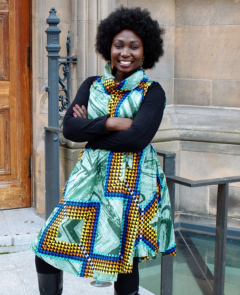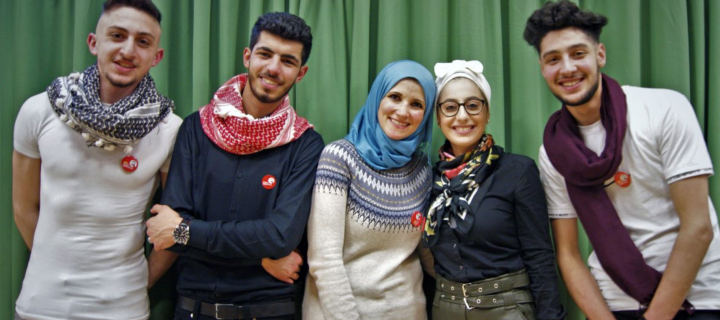Refugee Week 2020
The University is hosting an online Refugee Week showcasing Edinburgh’s support of refugee projects, centring around World Refugee Day on 20 June.
Refugee Week (15-21 June) in the UK is centred around World Refugee Day on 20 June. It is a nationwide programme of arts, cultural and educational events which aims to help facilitate a greater understanding of why people seek sanctuary and create a better understanding between different communities. This year’s theme is ‘Imagine’.
At a time when the potential for fear and isolation is great, Refugee Week online will be an invitation for us all to connect across borders, show solidarity and, together, imagine another world. You can get involved with an array of online events, or by doing one of the Refugee 2020 ‘Simple Acts’x
The University will also be taking part in the “Simple Acts” digital campaign, so check out The University of Edinburgh Facebook page and the uoe_iglobalcommunity Instagram account to get involved.
In Scotland, there is also a Refugee Festival Scotland that won’t physically be running this year, but will be instead honouring World Refugee Day digitally as well.
Celebrating Edinburgh’s support of refugee projects
The University of Edinburgh is proud to provide sanctuary for academics and young people and was the first UK University to be awarded University of Sanctuary status in June 2017. We reached out to a variety of student groups, community groups and individuals to find out more about some of the fantastic work being carried out in Edinburgh to support refugees in our community. We highlight on some incredible testimonials below, but to view all these stories and more in full - click on the storybook link at the end of this article.
Winner of the Unsung Hero Award
We spoke with Khadija Binladen, a fourth year International Relations student and member of the Refugee, Asylum and At-Risk Advisory Board, who was awarded the “Unsung Hero Award” at the online Student Awards this year. This Award recognises a University of Edinburgh student who has acted selflessly for a cause they are passionate about. Khadija has dedicated substantial amounts of her own time and energy to various Edinburgh refugee projects that are highlighted in this article, and has made a real impact on the lives of others. From managing the Befriending Scheme in the Syrian Futures Project, to being a Community Outreach Officer for Student Action for Refugees Edinburgh (STAR), Khadija works tirelessly to make all feel welcome. Incredibly, she is also the President of the Edinburgh University Middle Eastern Society, founding member of the Coexistence Initiative and organiser of STTEPS (The Syrian Teenage Tutoring Education Programme).
I know what it is like to be wrongly judged on stereotypes or false information so I work really hard to make sure that others never have to feel that way and that every environment I am a part of is a positive and welcoming one. Every individual is different but our differences make us unique and interesting and they should be celebrated!
We asked Khadija about what achievement she is most proud from the wonderful work she has carried out to support refugees, she said: “I am proud of all of it but a key moment for me that really changed my perspective on why I get involved and volunteer so much, was at STTEPS. I have been a lead organiser at STTEPS since my second semester of first year and the young Syrians I met on my first day were not the same individuals I saw on my last. Seeing them bloom into confident, talkative and engaging young individuals who really feel comfortable in their new community as well as improving academically was well worth the time and effort. They have all made me so incredibly proud and I am so honoured to have been a part of their lives so far.”
Syrian Teenager Tutoring & Educational Programme (STTEPS)
Expanding on Khadija’s involvement with STTEPS, this programme was launched by the University, represented by the Chaplaincy in co-operation with University student tutors and Dr Amer Masri from the Syrian Community in Edinburgh. This tutoring initiative is the first of its kind in Scotland and the UK. Composed of weekly two-hour tutoring sessions, it is aimed at supporting teenage Syrian refugees in their school subjects. The tutoring scheme’s goals are to help newly arrived Syrian teenagers with their English language skills and with education in other subjects, as well as social integration. Dr Masri mentioned his concerns about Syrian teenagers to Rev. Ali Newell of the Chaplaincy, and suggested university students might like to volunteer as tutors. “It just clicked,” Rev Newell said. “There’s a million things going on, but nothing for teenagers, and it’s perfect for our students.” They received a huge uptake of students volunteering their time as tutors, and the successful scheme has now continued at The Chaplaincy for the past three years.
Sohaib Ashraf, a tutor and second year International Relations student said: “One of the biggest inspirations for me is the idea of education, and communicating its importance for our lives and futures. For most of the Syrian teenagers, education was missing for them before they came to Edinburgh. Therefore, equipping them with the key tools is what the ethos of the programme is about.
Watch the video to learn more about STTEPS
- Video: STTEPS Refugee Week 2020
- Meeting of Syrian Teenager Tutoring and Education Programme (STTEPS) Zoom to celebrate refugee week. Teenagers, tutors and cofounders of the programme speak about their experience of the programme.
Offering a “Glimer” of hope
We spoke with Nasar Meer, Professor of Race, Identity and Citizenship at The University, and principal investigator of the research project: The Governance and Local Integration of Migrants and Europe’s Refugees (Glimer).
The current ‘migration crisis’ presents openings as well as challenges, and the aim of Glimer is to generate research that will help European cities and regions facilitate the long-term inclusion of displaced people in a way that remakes local spaces. The project is trying to understand how cities and local regions are responding to the so-called migration crisis in a way that is different from what a national level government have been doing. Nasar spoke about the motivations of finding that there are quite a lot of creativity, support and solidarity at local, council and city levels, which either isn’t properly recognised at national level or is not known about. Part of the rationale behind Glimer is to shed light on this, and help tell an optimistic story that despite a wider global context in which migration is seen as a challenge in a number of countries and rejected to, that actually in a number of places it is seen as an asset.
Professor Nasar Meer said: “A great many progressive developments in the western world wouldn’t be in existence were it not for the accident of seeking sanctuary, and those states that have granted it have found that they’ve blossomed and done better for them.”
Andhira: Among the most influential 20 women of 2020 at the University
Andhira is a remarkable and inspiring South Sudanese woman who grew up in a refugee camp in Kenya. Because of her personal story, she has always stood up for the rights of migrants and other displaced persons.

She is pursuing an MSc in international Development and has already years of experience working with local, regional and international organisations, in areas such as refugee assistance, communication and peace building. Having co-founded the youth led organisation, the Nuba foundation, she deeply understands the unique challenges faced by young leaders. She is specially attuned to challenges faced by women leaders and girls in Africa and more importantly the displaced woman. Andhira volunteers as programme manager in the Nuba Foundation and her work includes formulating and implementing youth empowerment and resource mobilisation programs. She also organises Sudanese refugee youth consultations designed to give refugee youths voice through dialogue with each other, and with the concerned stakeholders on issues affecting them.
Andhira is remarkably among the most influential 20 women of 2020 at the University of Edinburgh, and rightly so. Her programme director has said that “her activism and academic excellence are a testimony to all of us as well as an inspiration. She deserves to be encouraged and celebrated by our University community.”
My most important role is to inspire young women and especially young refugees.
Refugee Community Kitchen
Refugee Community Kitchen (RCK) is a fantastic initiative set up by a collective of students and Edinburgh locals who originally met whilst volunteering in Calais. This is where the central RCK is based, which provides between 1000 to 2000 hot meals a day to refugees and asylum seekers in the Northern France area. The principles of RCK is to provide hot meals with dignity to those in Edinburgh who may need it and to fundraise to continue the vital work also taking place in Calais. Alongside this, they partner with Streetworks and The Settlement project in Edinburgh to provide tasty, wholesome food to those who need it.
I find it intensely rewarding because it is a way to be part of a group, both students and not, and to have those all-important conversations and stand in solidarity with refugees in Calais as well as those suffering from food poverty across Edinburgh. The fact it is completely sustainable and uses ingredients donated by supermarkets adds an extra positive element.
Syrian Futures and STAR (Student Action for Refugees)
Syrian Futures started as a bridge to link Syrian refugees with the University of Edinburgh. The project aims to help Syrian refugees access higher education and employment. Along with these goals, the project works to raise their confidence, and to engage them with the local community so that they have a better understanding of the Scottish culture. This is achieved through organising social events, workshops, social gatherings, challenges, and online sessions.

Syrian Futures collaborate with STAR – a key society carrying out refugee work at the University. STAR seek to connect student with opportunities to campaign, fundraise and volunteer on behalf of refugees and asylum seekers in the UK and aim to educate people on refugees and correct misconceptions. Both these initiatives work well together with a shared aim to foster a sense of community with the refugees in Edinburgh by engaging and collaborating with them.
We hope that our digital Refugee Week this year helps to educate and raise awareness of the reality of refugee experiences, showcase the talent and expertise that refugees bring with them to the UK and celebrate Edinburgh’s support of refugee projects.
View our Storybook of stories and images showcasing Edinburgh’s involvement in refugee projects

